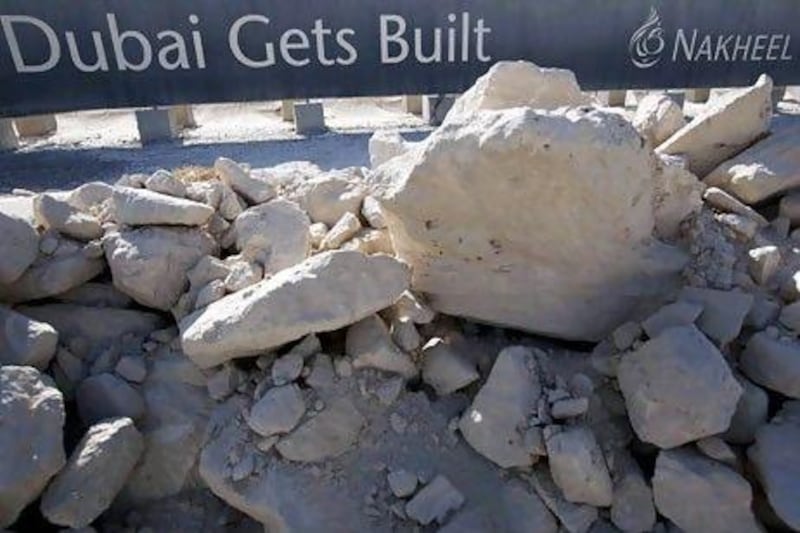Nakheel completed a Dh60 billion (US$16.33bn) financial restructuring yesterday and pledged to deliver almost 8,000 homes in the next year.
The announcement is likely to cheer investors who have waited years for their properties to be finished while also adding to the supply pressure on the depressed property market.
"We don't need more supply to come on to the market," said Majed Azzam, an analyst at AlembicHC in Dubai.
The properties range from villas in master-planned communities such as Jumeirah Village and Jumeirah Park to luxury homes on the Palm Jumeirah, where the Dubai property giant is also planning to build a shopping mall and a park. Construction on the projects is expected to begin later this year.
That wave of building comes as anticipated new supply is declining and prices are stabilising, according to a Jones Lang LaSalle report earlier this year.
And the new supply from Nakheel might not hurt prices much, Mr Azzam said, because they were already near a bottom and demand from Chinese and GCC investors would grow in a low interest-rate environment.
Central banks across the developed world have set rates at near zero in a bid to prevent recession, and yields on government debt are low. In that context, relatively easy mortgage financing and rental yields in Dubai of 6 per cent look attractive, Mr Azzam said. "From an investment standpoint it does make sense considering the low-interest environment we're going to be in."
The pledge to build new homes followed Nakheel's launch of its five-year financial restructuring yesterday.
As part of the move, Nakheel, Dubai's biggest state-owned developer, will issue an Islamic bond to unpaid contractors today, putting the final piece in a puzzle that took 18 months to assemble.
Ali Lootah, the chairman of Nakheel, said yesterday was a "great day in the history of Nakheel" after Dubai's property slump nearly put the company out of business.
"The completion of this financial restructuring is closing an old chapter and looking forward for delivery and meeting our commitments towards our investors and our trade creditors and also to re-establish the name of Nakheel and put forward new projects which are needed for our company and the Dubai economy," Mr Lootah said.
Nakheel was behind some of Dubai's most ambitious boom-time projects, including its trio of palm-shaped islands and The World, an archipelago in the rough shape of a world map. It was part of Dubai World, the government group that was the backbone of the emirate's rapid growth during the boom.
But as sales sagged and property prices declined in 2008, both Dubai World and Nakheel faced hard times, saddled with debt they could not refinance, few new property sales and a rising number of defaults on payments by customers.
Dubai World announced a standstill on debt repayments in November 2009, and Nakheel followed last March with its own recapitalisation plan, assisted by injections from the Dubai Financial Support Fund. The fund was created to distribute $20bn of aid from Abu Dhabi to companies in need.
Mr Lootah said Nakheel has been given about $8.6bn in government injections, below the $9.2bn total pledged last year.
The Islamic bond, or sukuk, was a key part of a Nakheel's recapitalisation plan, which served as the cornerstone of its effort to get back on its feet. Contractors with unpaid bills from Nakheel were given up to Dh500,000 in cash initially. Those owed more were to be paid 40 per cent in cash and 60 per cent in the form of sukuk shares yielding 10 per cent per year.
After numerous delays, Mr Lootah said a first Dh3.8bn piece of the sukuk would be issued today. Nakheel expects that additional claims from contractors could eventually increase the value of the sukuk to Dh4.8bn.
In all, Nakheel has paid out Dh6.7bn to contractors and suppliers, Mr Lootah said, calling them "priority number one".
He also held out an olive branch to average property investors, saying the company had already settled 60 per cent of its liabilities to them and was continuing to negotiate. The focus has been on giving investors credit notes for money paid into stalled projects and transferring them into properties that are going forward.
The company had about Dh10bn of liabilities on long-term projects, Mr Lootah said, and Nakheel had resolved about Dh6bn worth.
Investors who opt not to take credit notes or consolidate their investments would be paid in cash after five years, he said.
With the completion of the restructuring, Nakheel has been legally separated from Dubai World, Mr Lootah said. It is now owned fully and directly by the Dubai Government.
It is still unclear how the separation will affect cases involving Nakheel in the Dubai World Tribunal, a judicial body set up to handle claims against the conglomerate and its subsidiaries. Mr Lootah said existing cases would proceed, but that the company's legal team was evaluating how future cases would be dealt with.
The total value of Nakheel's restructuring is about Dh60bn, according to Sanjay Manchanda, its chief financial officer and acting chief executive. That included about Dh32bn in government injections, Dh19bn of trade creditor debt and Dh8bn in bank debt, he said.






